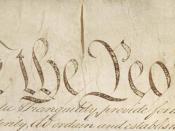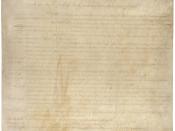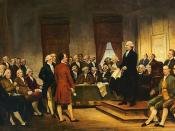Does the Constitution Forbid Religious Displays on Public Property?We look to the United States Constitution, to answer many questions about our government and our rights. It outlines the structure of our federal government, as well as the freedoms this country affords. When I first thought about the question, ÃÂDoes the Constitution forbid religious displays on public property?ÃÂ, I automatically assumed that it did not. But upon examination of the Constitution, and a little clarification on what it means, I believe otherwise.
First we need to examine what the Constitution says regarding religion. The First Amendment states ÃÂCongress shall make no law respecting an establishment of religion, or prohibiting the free exercise thereofÃÂ. There are actually two specific clauses stated here. The first is the Establishment Clause, which states ÃÂCongress shall make no law respecting an establishment of religionÃÂ. And the second is the Free Exercise clause which states that our government cannot prohibit our free exercise, of the religion of our choice.
The Establishment Clause is what we need to further examine, in regards to the display of religious symbols on public property. According to the Establishment Clause, the United States government cannot create a state religion, or promote one religion over others (Cheeseman 77).
To determine if religious symbols can be displayed on public property, next we need to define what public property is. ÃÂPublic PropertyÃÂ is defined by Princeton UniversityÃÂs Word Net as ÃÂproperty owned by a governmentÃÂ.
Since public property is owned by the government, it cannot be used to promote one religion over another, and that is why I believe the Constitution prohibits the display of religious symbols on public property. For example, if the government were to allow Christian, Jewish, Islamic, or other religious symbols to be displayed public property, they would be inherently...


